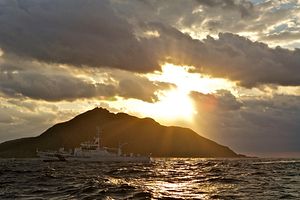The governments of Japan and China have reached an agreement on the implementation of a crisis management and communication mechanism to avoid sea and air clashes in disputed areas of the East China Sea. According to the Japanese Ministry of Foreign Affairs on Wednesday, the mechanism, which functions as a hotline between the two countries, will soon be operationalized.
The latest agreement, which Japan’s Kyodo news agency described as a “breakthrough,” was the result of a recent two-day meeting of senior diplomatic officials from both sides in Shanghai. Setting aside the accomplishment itself, the agreement on the implementation of the mechanism speaks to slowly improving relations between Japan and China following the Chinese Communist Party’s 19th Party Congress, which convened in October. Additionally, Japanese Prime Minister Shinzo Abe met Chinese President Xi Jinping on the sidelines of the Asia-Pacific Economic Cooperation (APEC) summit in Vietnam in November. Despite these signs of improving ties, incidents involving Chinese vessels and aircraft in Japan’s claimed territorial airspace and waters have remained high this year.
According to Kyodo, despite progress, talks over the hotline had been stalled amid disagreements over the mechanism’s applicability to incidents within Japan’s claimed territorial waters and airspace around the Senkaku Islands (defined as the 12-nautical-mile zone around the islands). “Japan has demanded that its territorial waters and airspace do not fall within the scope of the mechanism, out of concern that China could take advantage of the deal to strengthen its claim to the islands by interpreting the new framework as giving it a legitimate right to approach them,” Kyodo notes. The agreement reached this week, which has not been made public yet, reportedly satisfies both sides’ legal concerns.
Negotiations between the two countries over the mechanism, formally known as Japan-China Maritime Communications Mechanism (JCMCM), has been ongoing in some form for a decade. The ongoing Japan-China High-Level Consultation on Maritime Affairs, however, was set up in 2012. Beyond the crisis hotline, the two sides agreed at the onset of talks on the JCMCM to also include a range of other confidence building and crisis management features, including standardized communication protocols between their civilian law enforcement vessels and annual assessment meetings.
Both Japan and China claim the Senkaku Islands in the East China Sea. Tokyo currently administers the islands, but Beijing claims sovereignty over them. In 2012, the Japanese government nationalized the islands to prevent them from being acquired by a hypernationalist politician. Since the nationalization of the islands by Japan, the East China Sea has emerged as a major flashpoint between the two sides, with the Chinese People’s Liberation Army-Navy (PLAN) and Coast Guard testing Japan’s administration of the islands. In 2013, China additionally declared an air defense identification zone (ADIZ) over much of the East China Sea to emphasize its sovereignty in the area.

































